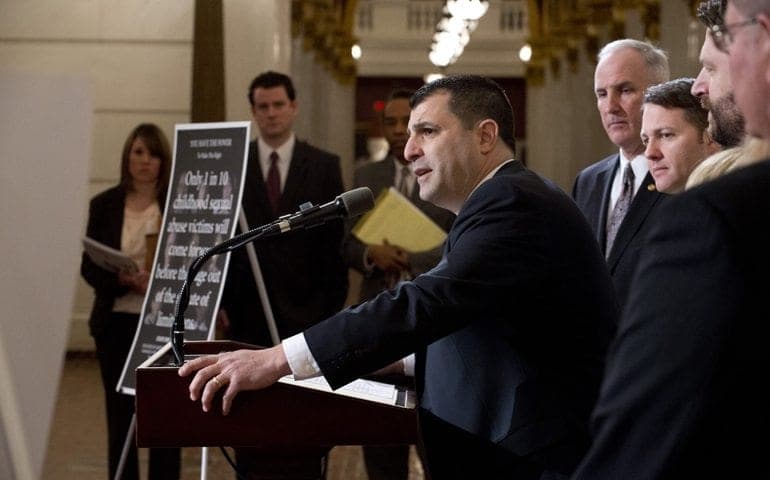ALBANY, New York — Every year, Bridie Farrell travels to the state Capitol hoping it’s the last time she has to urge lawmakers to pass the Child Victims Act and allow people molested as children to sue those responsible even after the statute of limitations on civil cases has expired.
Each year has been a disappointment as the measure falls flat under pressure from big institutions such as the Catholic Church. But after high-profile sexual misconduct allegations against big names in Hollywood, politics and the media, Farrell said she believes next year may be different.
Victims are feeling empowered, she said, and members of the public want action.
“Given Harvey Weinstein, given Roy Moore, people are fired up,” said Farrell, a former competitive speed skater who says she was molested by an older skater and mentor when she was a girl in the 1990s.
The long-debated measure known as the Child Victims Act would eliminate the civil and criminal statutes of limitations on abuse cases going forward. It also would create a one-time window, lasting a year, to allow for lawsuits no matter when the abuse is alleged to have occurred, basically giving a second chance to older cases in which the statutes of limitations have expired.
The bill is expected to take on a higher profile following recent allegations. Weinstein, once a powerful Hollywood producer, has been accused of sexual misconduct and assault, and Moore, an Alabama Republican running for the U.S. Senate, has been accused by multiple women of sexual misconduct when they were teenagers, as young as 14, and he was an adult. Weinstein has denied engaging in any non-consensual sex, and Moore has denied all wrongdoing despite mounting allegations.
New York now has one of the most restrictive statutes of limitations on child molestation in the country, along with states including Mississippi, Alabama and Michigan. Under current New York law, victims of child sexual abuse have until age 23 to pursue criminal charges or file lawsuits against their abusers.
Several other states including California, Minnesota, Connecticut, Massachusetts and Georgia have recently enacted laws to expand time frames for victims’ lawsuits. Massachusetts gives victims up to 35 years to sue. Ohio and Pennsylvania give victims until age 30.
The New York bill has passed the Democratic-controlled Assembly and earned the backing of Democratic Gov. Andrew Cuomo but hasn’t received a vote in the Republican-led Senate. The Catholic Church, the Boy Scouts and other large institutions oppose the bill, arguing the provision allowing for lawsuits for decades could do devastating financial harm to any institution that works with children.
A law in California, passed in 2002, resulted in Catholic dioceses there paying $1.2 billion in legal settlements.
New York’s Catholic Conference supports alternative legislation that would eliminate the criminal statute of limitations on child sex crimes, give victims until they are 28 to file civil suits and not create a window for molestation lawsuits now barred by the statute of limitations.
“We are open to any suggestion or any compromise that includes increasing or eliminating the criminal statute,” conference spokesman Dennis Poust said.
Poust noted that the Archdiocese of New York has voluntarily set up a compensation program to help victims of clergy sexual abuse.
Lawmakers will convene for the 2018 session in early January. A spokesman for Republican Senate Leader John Flanagan did not return messages seeking comment on the bill’s chances.
The bill’s sponsor in the Senate, Democrat Brad Hoylman, said he expects the recent spate of allegations against Moore, Weinstein and other men will influence the debate — if only because the cases show how it often takes years for victims, underage or not, to step forward and level accusations against men in positions of authority.
“National events have propelled this issue forward and serve as a rallying point,” he said. “I’m more optimistic than ever that this session will be the breakthrough that we’ve been waiting for.”















